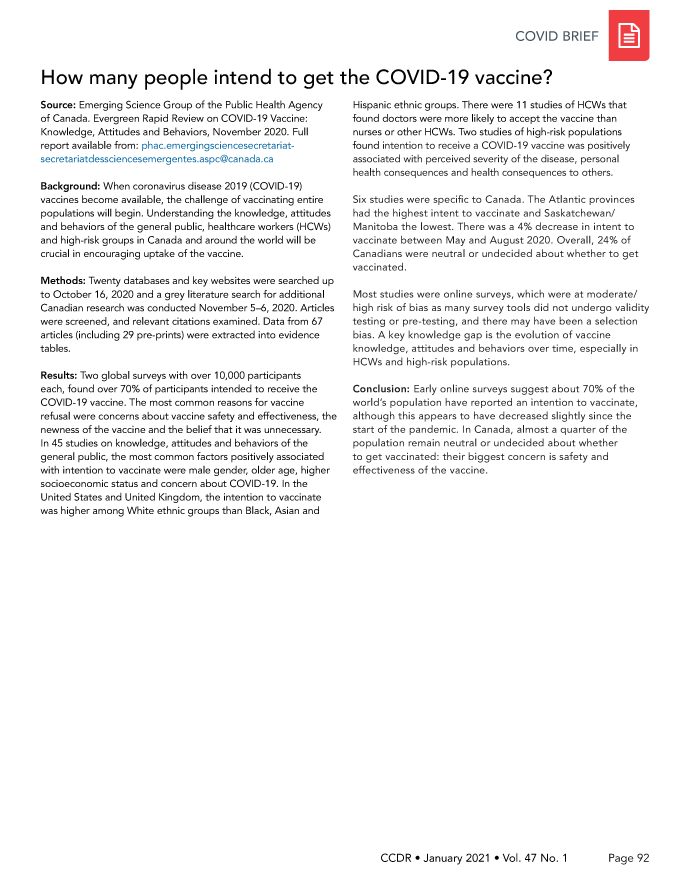Accepting the COVID-19 vaccine

 Download this article as a PDF
Download this article as a PDFPublished by: The Public Health Agency of Canada
Issue: Volume 47-01: Foodborne and Animal Contact Disease Outbreaks
Date published: January 2021
ISSN: 1481-8531
Submit a manuscript
About CCDR
Browse
Volume 47-01, January 2021: Foodborne and Animal Contact Disease Outbreaks
COVID brief
How many people intend to get the COVID-19 vaccine?
Source: Emerging Science Group of the Public Health Agency of Canada. Evergreen Rapid Review on COVID-19 Vaccine: Knowledge, Attitudes and Behaviors, November 2020. Full report available from: phac.emergingsciencesecretariat- secretariatdessciencesemergentes.aspc@canada.ca
Background: When coronavirus disease 2019 (COVID-19) vaccines become available, the challenge of vaccinating entire populations will begin. Understanding the knowledge, attitudes and behaviors of the general public, healthcare workers (HCWs) and high-risk groups in Canada and around the world will be crucial in encouraging uptake of the vaccine.
Methods: Twenty databases and key websites were searched up to October 16, 2020 and a grey literature search for additional Canadian research was conducted November 5–6, 2020. Articles were screened, and relevant citations examined. Data from 67 articles (including 29 pre-prints) were extracted into evidence tables.
Results: Two global surveys with over 10,000 participants each, found over 70% of participants intended to receive the COVID-19 vaccine. The most common reasons for vaccine refusal were concerns about vaccine safety and effectiveness, the newness of the vaccine and the belief that it was unnecessary. In 45 studies on knowledge, attitudes and behaviors of the general public, the most common factors positively associated with intention to vaccinate were male gender, older age, higher socioeconomic status and concern about COVID-19. In the United States and United Kingdom, the intention to vaccinate was higher among White ethnic groups than Black, Asian and Hispanic ethnic groups. There were 11 studies of HCWs that found doctors were more likely to accept the vaccine than nurses or other HCWs. Two studies of high-risk populations found intention to receive a COVID‐19 vaccine was positively associated with perceived severity of the disease, personal health consequences and health consequences to others.
Six studies were specific to Canada. The Atlantic provinces had the highest intent to vaccinate and Saskatchewan/ Manitoba the lowest. There was a 4% decrease in intent to vaccinate between May and August 2020. Overall, 24% of Canadians were neutral or undecided about whether to get vaccinated.
Most studies were online surveys, which were at moderate/ high risk of bias as many survey tools did not undergo validity testing or pre-testing, and there may have been a selection bias. A key knowledge gap is the evolution of vaccine knowledge, attitudes and behaviors over time, especially in HCWs and high-risk populations.
Conclusion: Early online surveys suggest about 70% of the world’s population have reported an intention to vaccinate, although this appears to have decreased slightly since the start of the pandemic. In Canada, almost a quarter of the population remain neutral or undecided about whether to get vaccinated: their biggest concern is safety and effectiveness of the vaccine.
